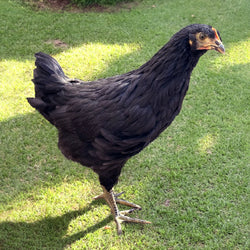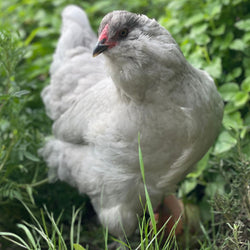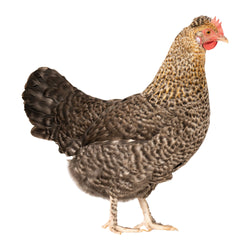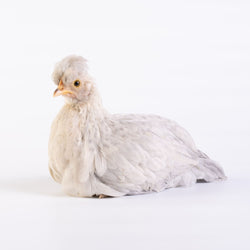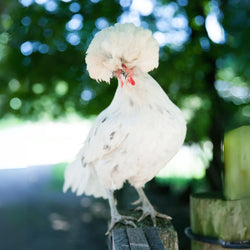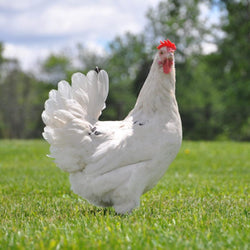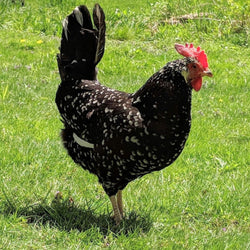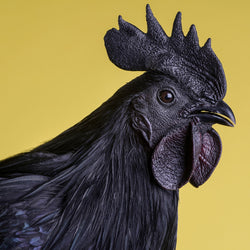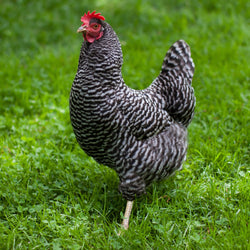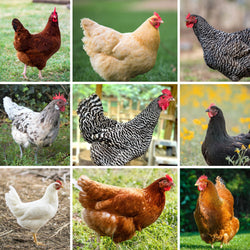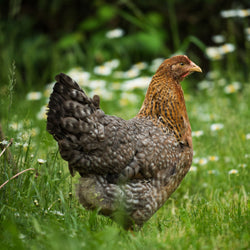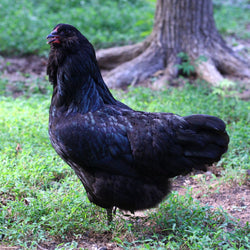page=11/--
Frequently Asked Questions
Here we answer the most commonly-asked questions about ordering, chicken care, and more.
Why is my chick growing her feathers in so slowly?
Sometimes you'll get a brood of chicks and notice that while many have grown in most of their feathers by eight weeks or so, one or two are slow feathering and seem delayed. It can be concerning, especially for first-time chicken moms and dads! It's usually nothing to be concerned about. Genetically, some breeds feather out more slowly than others. Breeds/crosses used for meat in particular tend to have slow-growing feathers, along with Brahmas, Cochins, Cornish, Rocks, and Orpingtons. In addition, breeds or crosses designed to be feather-sexed often have slow-feathering, so you may see it in sex-links like black...
Read MoreHow many eggs do chickens lay per year?
Exactly 157. (Just kidding!) Actually, how many eggs a chicken lays a year depends on a lot of things, but especially on the breed of your chicken and her age. For instance, young Leghorns may lay 300 eggs per year. Young Cochins may lay only 100 or so. Sumatras may lay 50 or fewer. By breed, you can see a general idea of how many eggs chickens may lay per week here on My Pet Chicken's chicken breed list. But keep in mind that as the birds get older, they will lay fewer eggs. And some breeds are not great...
Read MoreWhat chickens lay blue eggs? Green? Pink? Olive? Chocolate? Speckled?
Chickens that lay blue eggs. There are several breeds of chickens---and some mixed breed crosses---that lay blue eggs, including Ameraucanas, Araucanas, and Cream Legbars. The eggs they lay may vary in color from a pale blue to a quite striking sky blue. Do keep in mind that many American hatcheries are pretty deceptive about what type of chicken you're getting. So you may be getting an Easter Egger (below), but they'll tell you you're buying a one of the blue-egg layers. Sometimes they'll purposefully misspell the name: Americauna, Americana, Aracana, etc. Not cool, you guys! Chickens that lay blue or...
Read MoreWhat is a "heritage" chicken breed?
The definition of "heritage" in relation to chicken breeds is a bit flexible, but when we use the word, we're referring to breeds that have been around a long time, are non-hybrid, genetically stable, naturally-mating, and outdoor-hardy breeds that have proven valuable for generations. Heritage breeds are ones that have been around long enough to prove their usefulness as either egg layers, meat breeds, or dual-purpose breeds, and to become genetically stable--able to reproduce offspring true to the breed. As such, heritage breeds cannot be hybrids ("mutts" - the offspring of two different breeds), because hybrids do not breed true...
Read MoreHow much does it cost to raise chickens?
You knew this already: that depends on many different factors. Most importantly, it depends on what type of eggs you're buying at the grocery store. If you're buying the pricey, organic and/or pasture-raised eggs, then yes, it's possible to save money with a flock of your own. If you're looking to save money by keeping chickens.
Read MoreWhich chicken breeds may need extra heat in winter?
Chickens are incredibly adaptable! They are kept all over the world in all kinds of extreme climates. But it's no secret that some breeds are hardier in cold weather than others. Some breeds were not developed for cold-hardiness or have characteristics that make them more susceptible to cold than others. In a well-ventilated but not drafty coop, most chickens can stay warm by fluffing up their feathers to trap a layer of warm air against their bodies--as long as they are not wet and or exposed to a draft. Drafts can remove that "jacket" of warmer air surrounding the bird....
Read More







"The Clubhouse" Coop
Easy to assemble and built to last, the Clubhouse Coop is the perfect starter coop for a small flock.
